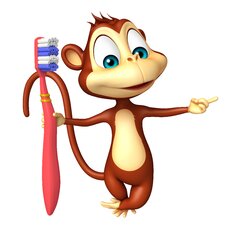Don't Monkey Around With Your Oral Health!
One of the best things you can do to ensure good oral hygiene for your child, is regular brushing twice daily, and introduce brushing and flossing as part of the daily routine. This will help to establish good oral habits as an important part of your child's day.
Brushing Instructions
- Brush two teeth at a time (width of the toothbrush).
- 'Count to ten' for every two teeth you brush.
- Brush gums and teeth with a toothbrush and toothpaste in a circular motion.
- Brush top and bottom teeth.
- Brush outside of teeth and gums, inside of teeth and gums and biting surface.
- Spit out after brushing – no rinsing so that the effects of fluoride are not diluted.
2 to 7 years olds
Children under seven years are not able to properly brush their own teeth and need a little help and supervision from an adult, the  same way they need help shampooing their hair and tying their shoelaces! There is lots of helpful information for preschools to encourage daily toothbrushing from the 'Brush Bunny' initiative, developed by Dr Catherine Waldon and Ms Sviatlana Anishchuk.
same way they need help shampooing their hair and tying their shoelaces! There is lots of helpful information for preschools to encourage daily toothbrushing from the 'Brush Bunny' initiative, developed by Dr Catherine Waldon and Ms Sviatlana Anishchuk.
At this age you can start to use a pea-size amount of fluoride toothpaste (at least 1000ppm) and encourage your child to spit out the toothpaste after brushing, but not rinse, so that the effects of the fluoride are not diluted. The amount of fluoride contained in a toothpaste is shown on the packaging.
Remember children should never eat or swallow toothpaste. Make sure a child never manages to eat toothpaste from the tube. It takes two to three minutes to brush teeth properly (about the length of a song). Brush gums and teeth in a gentle circular motion. The toothbrush should be changed every 2/3 months, or when the bristles are worn.
Brushing with a fluoride toothpaste is very effective in preventing dental decay. Regular toothbrushing removes plaque, which causes gum disease.This video aims to provide parents and carers of young children with some basic advice on when to start brushing their child's teeth and how to do it. The recommendations are in line with best practice in Ireland.
8 to 12 years olds
From age 8 or 9 years old, your child can be allowed to brush their own teeth but some supervision may still be necessary. For the most part, children should be able to do this independently. Have your child brush for 2-3 minutes (about the length of a song), using a pea-sized amount of at least 1000 ppm fluoride toothpaste. At this age, they can safely use an adult toothpaste variety rather than a child variety. And remember to change the toothbrush when the bristles are worn. After brushing, your child should spit out the toothpaste, but not rinse with water. This maintains the fluoride concentration on the teeth. Ask your dental team for advice on flossing technique for your child and floss daily.
Diet tips for children in general
- Choose healthy snacks and drinks between meals such as whole fruits. Suggestions include fruit, crisp raw vegetables, sandwiches, variety of breads, yoghurts, low fat cheese, plain popcorn and scones.
- Cereals such as porridge and shredded wheat are excellent energy providers, but avoid the sugar-coated types. In general, the sugar and salt content of breakfast cereals should be checked as some breakfast cereals are high in one or the other or both.
- Limit sweets, chocolate, biscuits and sugary drinks to mealtimes, maximum once or twice a week.
- Unflavoured milk and water are the most tooth friendly drinks and suitable to drink between meals.
- Limit fruit juice, pure juice or fruit smoothies to a small glass once a day, with a meal and always choose unsweetened.*
- Read food labels for sugar content. Less than 5g per 100g is low sugar.
- Drinks containing added sugars, including probiotic and yoghurt type drinks, should be consumed at meal times.
- Regular intake of carbonated drinks, including sparkling water, can lead to enamel erosion of the teeth and should be avoided.
*Fruit juices are an important source of vitamins in the diet. However, they should be taken with meals for two reasons. The frequent consumption of these can lead to enamel erosion and although pure juices may not contain sucrose they are rich in fructose and can also be cariogenic (cause tooth decay). As fructose in whole fruits pose little or no threat to dental health, whole fruits rather than fruit juices/smoothies should be consumed between meals.
As children grow into teens and become more independent and influenced by their peers, they can develop unwise food habits. Setting healthy eating habits early, is a great first step. Please see the Food Pyramid for Children age 1-4 years old which will help parents and carers to set children up with a healthy relationship with food for life.
Sports tips
- Always make sure your child wears a mouthguard when playing contact sports, to help reduce the risk of dental injuries.
- Water and milk are the best sports drinks for rehydration and milk also aids in muscle recovery.
- Check what to do if a tooth gets knocked out on our Save That Tooth poster.